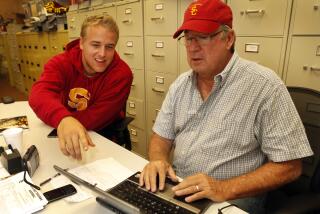The Late, Great Editor Nick Williams: ‘He Done Superb’
- Share via
In 1971, when Nick Williams retired as editor of The Times, I wrote a column expressing my respect and affection for him. Now that he has died, at 85, I can say what I couldn’t say then:
That I loved Mr. Williams more than any other man I have ever known.
In his sensitive obituary David Shaw noted that it was Mr. Williams, under the urging and guidance of young Otis Chandler, who turned The Times from a provincial rag into a prize-winning world newspaper.
Mr. Williams once recalled that when Otis took over as publisher, he called him into his office and said, “Nick, I want to make this one of the world’s great newspapers.”
Nick said, “Jesus Christ!”
I don’t know whether he was merely blaspheming or calling on the Lord for help. I do know that the three of them got the job done.
Nick was blunt and decisive. It was he who made me a daily columnist. I had been writing three a week while still working as a cityside reporter. He called me into his office, shoved his plastic-rimmed glasses back on his ample forehead, and said, “I don’t like to screw with success.”
But he was thinking of making a change. He wanted to know if I could write five columns a week, instead of three. I said I could if I were relieved of my cityside duties. “I’ll take care of that,” he said. When I returned to the city room the city editor had already been informed. I wrote five columns a week for the next 20 years.
I have told some of these stories before, but it seems important now to relate them to Nick’s memory.
My column used to appear in the Gary, Ind., newspaper. One day I received a letter from a young schoolteacher in a downstate Indiana farm center. She thought I lived and wrote in Gary, and she invited me to her wedding.
Nick happened to walk through the city room that morning and I showed the letter to him. He scanned it quickly. “You’re going, of course,” he said. I was astonished. “When a gentleman from The Times is invited to a young lady’s wedding, he goes,” he said. I went by plane, train and rented car and came back with rice in my hair.
When my son married his French fiancee in Tours, I bought my wife a coat and put her on a plane for Paris. Her parents were French immigrants, but she had never been to France. I told her it was now or never. I didn’t have the money or the vacation time to go myself, which I explained in a column.
That morning Nick called me to his office. “What the hell are you trying to do to me?” he said. “Women keep calling me up, wanting to know what kind of a man I am, not letting Jack Smith go to his own son’s wedding.”
I explained my situation. “You have a passport?” he asked. I said I could get one. “You better go,” he said. The Times sent me.
Nick was one of the best writing editors in the country. He was especially admired at The Times for his interoffice memos, which were brief, incisive scrawls on little squares of paper, in pencil. I have a treasured file of them.
I prevailed upon him to write a brief preface for one of my books, knowing it would not hurt the sale any. In it he said, “I don’t think he will like me saying all this.” I knew purists would complain that his me should be my , but I wasn’t about to change it.
When the proofs came back from New York I was infuriated to see that some copy editor had changed Mr. Williams’ me to my . I wrote him an angry letter insisting that he change it back to me .
Then I had second thoughts. It was Mr. Williams’ sentence; perhaps I should have let him decide. I sent a copy of my letter up to Nick with this query: “Did I do right?”
I got back one of Mr. Williams’ brief, incisive memos: “You done superb.”
I take the liberty of quoting briefly from the column I wrote on his retirement. “He is extremely effective with women, and vice versa. It often surprises lesser editors of The Times editorial staff to discover that their wives have a crush on Mr. Williams and want to kiss him on his forehead, which has grown more spacious with the years . . . .
“He is the despair of prudes, phonies and tailors. . . . He has the most sophisticated and incisive mind of any person I know, and is certainly one of the half dozen greatest metropolitan newspaper editors this country has ever had.”
I have often been asked, “Who were the other five?”
I haven’t the slightest idea. It doesn’t matter.


